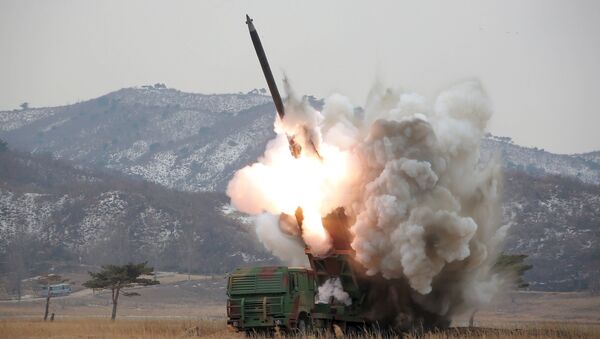WASHINGTON (Sputnik) — The new sanctions target North Korea’s trade in metal, graphite, coal, software and revenue streams from workers abroad. They also block property and interests in property of the North Korean government as well as of 20 of the country’s vessels. Moreover, the sanctions prohibit exports or reexports of goods, services and technology to North Korea and new investments by US persons regardless of where they are located.
There is little likelihood the new US sanctions would actually accomplish anything, but the Obama administration still had to go ahead and impose the measures anyway, Fordham University Political Science Professor Raymond Kuo told Sputnik on Thursday.
"Nevertheless, recent multilateral and US sanctions send an important signal that the North Korea’s launch of a long-range missile and test of a nuclear device are not acceptable," Kuo stated.
Former US diplomat James George Jatras warned that unilateral penalties imposed in an executive order signed by President Barack Obama could prove counterproductive.
"It evidently doesn’t occur to anyone in the Obama administration that North Korea needs to stop being ‘our’ problem and should be the regional concern, primarily of China, Russia, Japan, and South Korea, with the US playing a secondary and supportive role," he observed.
Jatras explained that the sanctions strategy, regardless of being expanded to affect different sectors and entities to weaken and punish North Korea, has always backfired in the past and only resulted in strengthening the regimes against which they were targeted.
"A North Korean collapse [is] presumably the intended goal of the sanctions, though that never seems to work: Look at Cuba, Iraq, Iran [and] Russia," he said.
Coupled with US military build-ups and exercises on the Korean peninsula, sanctions have only driven Pyongyang into even more hardline positions and alarmed China to increase support for a North Korean regime it otherwise distrusted, Jatras, a former adviser for Republican leaders in the US Senate, explained.
"In the event of a North Korean collapse a reunification of the peninsula under a Seoul government allied with the United States means, for China, the prospect of American troops on the Yalu. That outcome is one Beijing will never permit to occur," he pointed out.
China sided with the United States by voting for the UN Security Council sanctions on North Korea earlier this month. But when the US followed with additional sanctions of its own on Wednesday, China immediately criticized the United States for acting unilaterally.
The UN sanctions will require international inspectors to certify that all ships entering and leaving North Korean ports to be certified free of weapons. The US sanctions go further, allowing for all individuals who do business with North Korea to be blacklisted — a step that effectively ends access to the international banking system.
Kuo noted that the United States has consistently sought China’s help in persuading its longtime ally to soften its threatening posture, with minimal success. As North Korea’s main source of food and oil, China has plenty of leverage over North Korea, he said.
"The issue is not in terms of economics or logistics. It’s about politics," Kuo explained. "Does China actually want to exercise their influence? Right now that’s highly unlikely."
"Nothing thus far has significantly changed Chinese incentives on its North Korea policy. From China's perspective, Kuo said, they prefer to have a stable government in Pyongyang, even if it is a nuclear power."
Moves to penalize North Korea followed a February 7 ballistic missile launch and a January 6 nuclear test.



